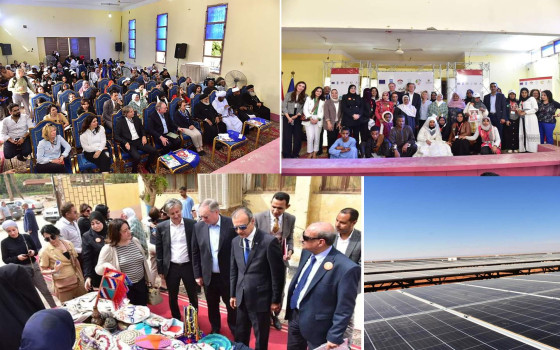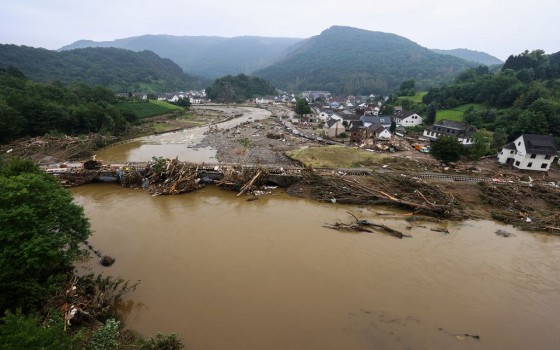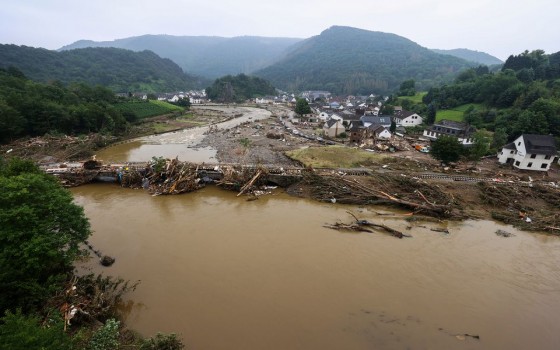
A huge project to generate electricity from solar energy in Aswan in cooperation between Egypt and the United Nations

- Europe and Arabs
- Thursday , 25 January 2024 16:48 PM GMT
New York - Aswan: Europe and the Arabs
The United Nations Sustainable Development Goal 7 seeks to promote broader access to energy and improved use of renewable energy. On January 26, the United Nations commemorates International Clean Energy Day, emphasizing its vital role in reducing greenhouse gas emissions in a world combating climate change while providing for the needs of all societies.
In a report published by United Nations News from its correspondent in Egypt, Khaled Abdel Wahab, light was shed on a giant solar energy project in Aswan Governorate in Upper Egypt (south). The United Nations Development Program was quoted as saying that Egypt has begun an ambitious program to reform energy policy, with the goal of 40% of electricity coming from renewable energy sources by 2035, pointing out that it is transforming its energy market by investing in energy efficiency and diversifying its energy mix from By investing more in alternative renewable energy sources such as solar and wind energy. According to the report, “The project to generate electricity from solar energy in the village of Benban, affiliated with the Daraw Center north of the city of Aswan, Egypt, is one of the giant projects in the field of producing clean and renewable energy, as Dr. Hani Mostafa, general coordinator of the solar energy project in Benban in Aswan, says:
“This project consists of forty solar power stations, each of which produces 50 megawatts, with a total production of 2,000 megawatts. It is considered the largest combined solar station in the world. The idea of establishing it came under the direction of President Abdel Fattah El-Sisi in 2014 to produce electricity with clean energy. The project has provided about 30 One thousand job opportunities for engineers, supervisors, technicians and workers, and the area of one station is 250 acres, and these stations produce approximately 90% of the production of the High Dam. The selection of the Benban area in the Daraw Center in Aswan Governorate to implement the project was taken into account because it is the sunniest area throughout the year in Egypt, and it is at the peak of Production takes place in the afternoon from twelve to one o'clock in the afternoon.
The Minister of Electricity, Dr. Mohamed Shaker, says that the Benban solar energy project in Aswan Governorate is the most important national project that Egypt has witnessed in the field of clean energy, and it is also one of the largest global projects in the field of renewable energy:
“The location of the village of Benban in Aswan was chosen due to the nature of its geographical location and the continued sunshine there throughout the world, which makes its solar stations the most prolific in producing electricity, not only at the local level, but also at the world level at the present time.”
In addition to the presence of nearly forty companies in the project to produce electricity from solar energy in Benban, Aswan, there are international participations in the project for both the European Union and the United Nations Development Programme. Mr. Alessandro Fracasetti, UNDP Resident Representative in Egypt, says, “This project will help us advance Egypt’s transition to a green energy market, unleash the innovation potential in solar energy,” and accelerate the country’s transition towards sustainable development, and this is what was agreed upon at the Sharm Climate Conference. Sheikh.
He added, "During the Sharm El-Sheikh Climate Summit in Egypt the year before last, the action plan at this summit confirmed the international community's commitment to keeping the average temperature rise below two degrees Celsius, according to the latest report of the Global Reference for Climate Change Science and the Intergovernmental Panel on Climate Change. Therefore, This matter requires immediate action to reduce the supply and demand for fossil fuels and transition to renewable energy on a large scale. The global trend for sustainable energy transition will continue to be driven by unprecedented progress in energy technologies, which provides great opportunities for foreign investments in developing countries.”
The UN official added that the Egyptian government has provided tremendous opportunities as it signed agreements to promote green hydrogen and renewable energy, including a historic agreement to deploy 10 gigawatts of renewable energy by 2030, while providing 5 gigawatts from inefficient gas-fired facilities.
The representative of the United Nations Development Program praised Egypt’s role in issuing the Nationally Determined Contributions report, which he said included ambitious goals to increase the contribution of renewable energy to electrical energy to 42% by 2035 and reduce emissions in the electricity sector by 33% and of gases associated with oil and gas by 65%. . He added that this requires serious work not only on the part of the Egyptian government, but also on the part of its development partners and the private sector.
He said: “The United Nations Development Program in Egypt has long supported the clean energy transition by enhancing the efficiency of renewable and decentralized energy technologies. For example, more than 200 million energy-saving LED lamps have been sold in the Egyptian market since 2014, and this came as a result of the partnership between the United Nations Development Program and the Ministry of Egyptian Electricity within the framework of the market transformation for energy-efficient lighting.
10% of the profits from the solar energy project in Benban were allocated to support the surrounding local community, and this is confirmed by Engineer Hossam Sultan, Director of the Solar Energy Investors Association in Aswan:
“This project is among the four largest solar energy projects in the world, and we targeted the surrounding community with a social responsibility plan. We studied the needs of the people here in Benban and found that there is a need for intervention in three sectors: health, education, and economic empowerment. The association contributed to the establishment of an energy technical secondary school.” Al-Shamiya’s students are training practically in this project.”
Engineer Amira Ghandour, who works in one of the companies in the project, confirms that the project contributes to solving societal problems in the local community:
“The project was not limited to buildings, construction and technical works, but those in charge of the project worked to serve the surrounding community
By providing dialysis units to treat patients with kidney failure, in addition to providing distinguished educational opportunities for the villagers through the Solar Energy School.”
The Benban solar energy project has won many awards, including the World Bank’s annual award as the best distinguished bank project in the world in 2019, and the Arab Government Excellence Award in its first session as the best infrastructure development project. In parallel with the project and in the village of Benban, a joint secondary energy school was established. Al-Shamsia, and there we met the school director, Mr. Youssef Fouad, with the student, Israa Abdel Hamid:
“The school’s curriculum contains cultural subjects such as Arabic, English, mathematics, chemistry, and physics, and there are practical subjects related to electricity, such as circuits, installations, maintenance, and specialized sports.”
“At the Solar Energy School, I study practical studies such as connecting cables and how to solve problems. I chose this field because I see that the future is renewable solar energy. I am happy to serve my country through this field, which is of great benefit to my country, Egypt.”
In partnership between the Egyptian government, the private sector, and a number of international organizations, including the United Nations Development Programme, the Benban solar electricity generation project works to provide renewable energy to reduce greenhouse gas emissions in Egypt, improve access to clean energy, promote local economic development, and reduce... Consumption of fossil fuels, in pursuit of achieving the seventh goal of the United Nations Sustainable Development Goals.












No Comments Found